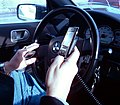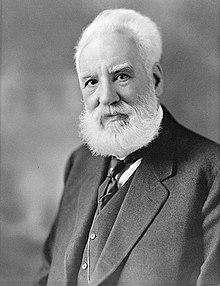
A telephone, colloquially referred to as a phone, is a telecommunications device that permits two or more users to conduct a conversation when they are too far apart to be easily heard directly. A telephone converts sound, typically and most efficiently the human voice, into electronic signals that are transmitted via cables and other communication channels to another telephone which reproduces the sound to the receiving user. The term is derived from Ancient Greek: τῆλε, romanized: tēle, lit. 'far' and φωνή (phōnē, voice), together meaning distant voice.
In 1876, Alexander Graham Bell was the first to be granted a United States patent for a device that produced clearly intelligible replication of the human voice at a second device. This instrument was further developed by many others, and became rapidly indispensable in business, government, and in households. (Full article...)

A mobile phone or cell phone is a portable telephone that can make and receive calls over a radio frequency link while the user is moving within a telephone service area, as opposed to a fixed-location phone (landline phone). The radio frequency link establishes a connection to the switching systems of a mobile phone operator, which provides access to the public switched telephone network (PSTN). Modern mobile telephone services use a cellular network architecture, and therefore mobile telephones are called cellphones (or "cell phones") in North America. In addition to telephony, digital mobile phones support a variety of other services, such as text messaging, multimedia messaging, email, Internet access (via LTE, 5G NR or Wi-Fi), short-range wireless communications (infrared, Bluetooth), satellite access (navigation, messaging connectivity), business applications, payments (via NFC), multimedia playback and streaming (radio, television), digital photography, and video games. Mobile phones offering only basic capabilities are known as feature phones (slang: "dumbphones"); mobile phones that offer greatly advanced computing capabilities are referred to as smartphones. (Full article...)
A smartphone, often simply called a phone, is a mobile device that combines the functionality of a traditional mobile phone with advanced computing capabilities. It typically has a touchscreen interface, allowing users to access a wide range of applications and services, such as web browsing, email, and social media, as well as multimedia playback and streaming. Smartphones have built-in cameras, GPS navigation, and support for various communication methods, including voice calls, text messaging, and internet-based messaging apps. (Full article...)
Selected article -

Mobile phone use while driving is common but it is dangerous due to its potential for causing distracted driving and subsequent crashes. Due to the number of crashes that are related to conducting calls on a phone and texting while driving, some jurisdictions have made the use of calling on a phone while driving illegal in an attempt to curb the practice, with varying levels of efficacy. Many jurisdictions have enacted laws making handheld mobile phone use illegal. Many jurisdictions allow use of a hands-free device. Driving while using a hands-free device has been found by some studies to provide little to no benefit versus holding the device itself and carrying on a conversation. In some cases restrictions are directed only at minors, those who are newly qualified license holders (particularly those of a younger age), or to drivers in school zones. In addition to voice calling, activities such as texting while driving, web browsing, playing video games, or phone use in general may also increase the risk of a crash.
In the United States, automobile crashes due to distracted driving are increasing even after the passage of laws intended to lessen such use while driving. Using a cell phone while driving increases the driver's risk of causing a crash. Drivers can become distracted, decreasing the driver's awareness on the road, leading to more car crashes. When drivers talk on cell phones the risk of an automobile crash resulting in hospitalization is four times higher than when not talking on a cell phone. Drivers who text when behind the wheel are twenty-three times more likely to have an automobile crash. One out of every four automobile crashes in the United States are caused by texting while driving. (Full article...)Types of phones -

Selected audio -
Ringing tone (audible ringing, also ringback tone) is a signaling tone in telecommunication that is heard by the originator of a telephone call while the destination terminal is alerting the receiving party. The tone is typically a repeated cadence similar to a traditional power ringing signal (ringtone), but is usually not played synchronously. Various telecommunication groups, such as the Bell System and the General Post Office (GPO) developed standards, in part taken over by the European Telecommunications Standards Institute (ETSI) and other standards bodies. With modern cell phone and smartphone technology ringing tone can be customized and even used for advertising. (Full article...)
List articles

- Comparison of smartphones
- List of best-selling mobile phones
- List of countries by number of broadband Internet subscriptions
- List of countries by number of telephone lines in use
- List of countries by smartphone penetration
- List of country calling codes
- List of iPhone models
- List of mobile network operators
- List of mobile phone brands by country
- List of mobile phone generations
- List of telecommunications companies
Related portals
General images -
Selected biography
Alexander Graham Bell (/ˈɡreɪ.əm/, born Alexander Bell; March 3, 1847 – August 2, 1922) was a Scottish-born Canadian-American inventor, scientist and engineer who is credited with patenting the first practical telephone. He also co-founded the American Telephone and Telegraph Company (AT&T) in 1885.[additional citation(s) needed]
Bell's father, grandfather, and brother had all been associated with work on elocution and speech, and both his mother and wife were deaf; profoundly influencing Bell's life's work. His research on hearing and speech further led him to experiment with hearing devices which eventually culminated in Bell being awarded the first U.S. patent for the telephone, on March 7, 1876. Bell considered his invention an intrusion on his real work as a scientist and refused to have a telephone in his study.
Many other inventions marked Bell's later life, including groundbreaking work in optical telecommunications, hydrofoils, and aeronautics. Bell also had a strong influence on the National Geographic Society and its magazine while serving as the second president from January 7, 1898, until 1903. (Full article...)Selected images
Topics
Subcategories

More
 |
Here are some tasks awaiting attention:
|
Telephones in the news
No recent news
Associated Wikimedia
The following Wikimedia Foundation sister projects provide more on this subject:
-
Commons
Free media repository -
Wikibooks
Free textbooks and manuals -
Wikidata
Free knowledge base -
Wikinews
Free-content news -
Wikiquote
Collection of quotations -
Wikisource
Free-content library -
Wikiversity
Free learning tools -
Wiktionary
Dictionary and thesaurus













































































































